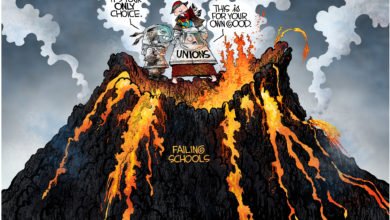In the War on Coal – It’s Grundy vs. Obama
In another episode in the annals of the Obama administration’s war on coal, the town of Grundy, Virginia is being denied its right to indulge in the American dream. They want to expand their small air field, in order to accommodate private jets to stimulate economic development. The problem is that a portion of the runway expansion lies on top of coal. Hence, this story – and many others like it – are critical as Grundy is in the heart of coal country.
Grundy is about an hour an a half from Abingdon and rests between the three-way border of Kentucky, West Virginia and Virginia. This area could be critical in deciding the upcoming presidential election. The federal quarantine on Grundy’s economic plans has been going on for three years according to Debra McCown of the Bristol Herald Courier, who reported on this development for The Washington Times. That’s just around the time when the Obama administration stopped issuing coal permits.
McCown wrote yesterday that “Donnie Rife is chairman of the Dickenson County Board of Supervisors and a member of the Breaks Regional Airport Authority, the regional entity working on the project… said it might be tough to explain the nuances to federal regulators, but ‘there’s a huge difference in mining coal and building an airport…mining is involved, he said, because the area’s severe topography makes construction impossible otherwise in the hilly terrain. The original airport was built on a piece of land made flat by surface mining by United Coal Co., which gave the land to Grundy.”
Furthermore,”Mr. Rife said the delay has cost an estimated $20 million. Three years ago, he said, the coal that underlies the runway site would have sold for a higher price, helping offset the cost of what could be a $60 million project. He said the lengthened runway is crucial to the region’s plans to attract business and investment.”
Moreover, the parties involved aren’t even asking for a coal mining permit – they’re asking if they can expand the runway.
According to McCown:
Modernizing the airport is part of a broader plan to open up this part of Appalachia by developing infrastructure, a concept made possible by the ability to move mountains, thanks to equipment used by the industry that drives the local economy: coal mining. The first miles of a four-lane highway, the Coalfields Expressway, already are taking shape, thanks to public-private partnerships with two mining companies. Mr. Rife said the airport is a key piece of the region’s economic development plan.
Ironically, it is the coal that underlies the airport site that is causing the delay. The Virginia Department of Mines, Minerals and Energy initially approved the airport authority’s proposal, spokesman Mike Abbott said.
The mining department determined that the project was exempt from the need for a mining permit, including a government-financed exemption, which applies to government-financed projects and an Abandoned Mine Land Enhancement grant, which applies to projects where the coal removed is “incidental” to reclaiming the land and removal is necessary to address other hazards.
Mr. Puckett [State Senator (D-Lebanon)] said that under an initial public-private partnership, Alpha Natural Resources, a Southwest Virginia-based coal company, would bring the runway to rough grade and, in the process, mine the site and reclaim a dangerous highwall — a clifflike scar left on the landscape by previous mining.
Ted Pile, spokesman for Alpha, said the company would have lowered the mountain beneath the airport’s existing site, creating enough flat land to extend the 2,200-foot runway to 5,700 feet. But the Office of Surface Mining, which operates in the U.S. Department of the Interior and has the right to review projects involving abandoned mine properties, balked.
The issue has stoked anger against the Obama administration amongst voters in these areas. In the Williamson Daily News, a local paper circulated in Kentucky and West Virginia, staff writer Julia Roberts Goad wrote on October 13 about how United for Coal, “a citizens group created to support the coal mining industry” has declared that “our government has decided to commit ‘Regional Genocide’ against our people [with this regulatory onslaught]”
Two years ago, Bill Raney, also of Williamson Daily News, wrote that:
The EPA has declared a war on Appalachian coal. The agency’s apparent intent to rescind the already issued Spruce Mine permit is the first time such an action has been taken and shows a reckless disregard for the impact on our people, on future investment in our region and even basic fairness. If EPA pursues this course, the very future of mining in our state and region… not just mountaintop mining operations or even surface mining … but all forms of mining is threatened, and with it the futures of 50,000 West Virginian and 80,000 Appalachian families whose livelihoods depend on mining coal.
[…]
The EPA issued the Spruce Mine permit almost three years ago. During a 10-year review prior to its issuance, the EPA participated along with the other agencies every step of the way during the review and praised the company’s efforts to design the project in such a way as to minimize the impact on the environment. In fact, total recoverable reserves of coal were reduced by 10.6 million tons as a result. It is not an exaggeration to say this permit is the most scrutinized mining permit in the history of West Virginia or the Appalachian region. But the issue goes far beyond a single permit. If EPA revokes the Spruce permit, their action brings into question all forms of economic development across the region – anything that requires a company or an individual to move a shovelful of dirt.
Furthermore, these jobs are part of the American middle class, which Barack Obama, Joe Biden, and the Democrats say Republicans wish to destroy. It’s odd since “the jobs created by the Spruce permit would be high-paying, long-term employment opportunities. These jobs would pay approximately $70,000 annually with full benefits and the total economic impact of this operation is estimated at approximately $15 0 million annually.” Mr. Romney wants to strengthen this sector of the economy.
Although, there seems to be some government support for the coal industry. Back in March, a federal judge excoriated the EPA for their “magical thinking” in denying permits issued by the Army Corps of Engineers.
‘EPA resorts to magical thinking’ to justify nullifying permits issued by the U.S. Army Corps of Engineers for Arch Coal Inc.’s Mingo Logan mine in West Virginia, wrote U.S. District Judge Amy Berman Jackson in Washington, D.C.
Berman Jackson said the EPA’s effort to revoke permits already issued by the Army Corps lacked the backing of any statutory provision or regulation. ‘It posits a scenario involving the automatic self-destruction of a written permit issued by an entirely separate federal agency after years of study and consideration,’ the opinion says.
‘Poof! Not only is this nonrevocation revocation logistically complicated,’ the ruling said, but it also robs industry of the only way they can possibly measure compliance with the Clean Water Act — a permit. EPA ignored the effect that granting itself the right to revoke Army Corps permits could cause uncertainty and financial harm to industries dependent on capital credit for projects involving waterways. [The] ’EPA brushed these objections away by characterizing them as hyperbole,’ the judge wrote. ‘Even if the gloomy prophesies are somewhat overstated,” the concerns are real, she said. Berman called the EPA’s interpretation of the Clean Water Act — which she separately lambasts for being poorly written — ‘illogical and impractical.’
Last Wednesday, FreedomWorks had an unannounced press conference about the war on coal in the Harrisburg Capitol, which caught the attention of legislators in this coal producing and battleground state. All along the Appalachian Trail, the families of coal miners and the families of businesses dependent on coal mining are saying “enough!”
Grundy’s plight is one of many stories in this administrations unabashed hatred for coal and the communities they are set to destroy if they’re successful at winning re-election this upcoming November. Sadly, since federal regulators have stonewalled Grundy’s hopes at economic success, it’s most likely going to cost the town. As McCown quoted Ted Pile at the end of her column, “if this [Grundy airport] project were allowed to go forward when it was first proposed, it would have essentially meant zero cost to taxpayers for a fully prepared airport site…now, because the coal markets have gotten worse, the economics no longer work. It’s a missed opportunity.”





